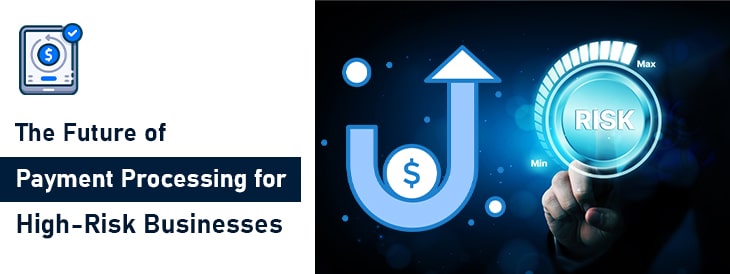The Future of Payment Processing for High-Risk Businesses
The Future of Payment Processing for High-Risk Businesses

As the digital economy continues to expand, high-risk businesses are navigating a complex payment processing landscape that poses unique challenges and opportunities. The future of payment processing for these businesses is evolving, with innovative solutions emerging to address their specific needs.
High-risk industries, such as online gaming, adult services, and certain e-commerce sectors, often struggle with traditional payment processors that shy away from their operations due to perceived risks. However, advancements in technology and a growing understanding of these markets are paving the way for more tailored payment solutions.
By focusing on the future high-risk processing landscape, businesses can leverage alternative payment methods, blockchain technology, and enhanced fraud detection tools to ensure secure transactions. As these trends continue to develop, high-risk businesses can position themselves for success in a competitive marketplace, ultimately fostering a more inclusive financial ecosystem.
Technological Advancements in Payment Processing
Technological advancements are revolutionizing payment processing for high-risk businesses, offering new avenues to manage transactions more efficiently and securely. One of the most significant developments is the integration of artificial intelligence (AI) and machine learning algorithms.
Which are being used to enhance fraud detection and prevention. These technologies analyze vast amounts of transaction data in real-time, identifying patterns and anomalies that could indicate fraudulent activity, thereby reducing the risk of chargebacks and financial loss.
Blockchain technology is another game-changer, providing a decentralized and transparent ledger system that ensures transaction integrity and security. By utilizing blockchain, high-risk businesses can benefit from lower processing fees and faster transaction times, as well as increased trust from customers wary of traditional payment methods.
Additionally, the rise of alternative payment methods such as cryptocurrencies, digital wallets, and mobile payments is reshaping the payment landscape. These options offer high-risk businesses greater flexibility and access to a broader customer base. Cryptocurrencies, in particular, provide an extra layer of anonymity and security, which can be especially appealing to industries with privacy concerns.
With these technological advancements, high-risk businesses are better equipped to handle the complexities of payment processing, ultimately enabling smoother and more secure transactions.
Some Related Blogs
- How to Deal With Chargebacks and Fraud in High-Risk Payment Processing
- The Latest Trends in Payment Processing Technology For High-Risk Businesses
- The Impact of Regulations on High-Risk Payment Processing
- Tips For Securing Your Online Payment Transactions For High-Risk Businesses
Regulatory Changes and Their Impact
Regulatory changes are a critical factor shaping the future of payment processing for high-risk businesses. Governments and financial institutions are increasingly implementing stringent measures to ensure compliance and security in the payment ecosystem. For high-risk industries, this often means navigating a labyrinth of legal requirements.
Which can include enhanced Know Your Customer (KYC) protocols, anti-money laundering (AML) measures, and stringent reporting standards. These regulatory frameworks are designed to mitigate risks but can also pose challenges for businesses that may already be struggling with limited payment options.
In response to these regulatory demands, payment processors specializing in high-risk industries are developing more robust compliance tools and services. These solutions aim to streamline the verification process, making it easier for businesses to adhere to regulatory standards without sacrificing operational efficiency.
Additionally, regulatory bodies are increasingly recognizing the unique needs of high-risk sectors and are beginning to tailor their guidelines accordingly, offering some flexibility while maintaining strict oversight.
As the regulatory landscape continues to evolve, staying abreast of these changes is essential for high-risk businesses to remain compliant and competitive. Working closely with specialized payment processors can help navigate this complex environment, ensuring that businesses can focus on growth and innovation while meeting regulatory obligations.
Trends in Consumer Behavior
Trends in consumer behavior are significantly influencing the future of payment processing for high-risk businesses. One noticeable shift is the growing preference for digital and contactless payment methods. Consumers are increasingly opting for the convenience and speed of digital wallets, mobile payments, and even cryptocurrencies. This trend is particularly beneficial for high-risk businesses, as it allows them to offer more versatile and secure payment options that cater to tech-savvy customers.
Another key trend is the heightened concern for privacy and data security. As consumers become more aware of data breaches and identity theft, they are demanding higher levels of security from businesses. This has led to a rise in the adoption of advanced encryption methods and secure payment gateways.
Moreover, the increasing global nature of commerce means consumers are looking for seamless, cross-border payment solutions. High-risk businesses that can provide a smooth and hassle-free international payment experience are likely to attract a broader customer base.
Lastly, the demand for personalized shopping experiences is driving businesses to adopt more sophisticated payment analytics, allowing them to tailor their offerings and improve customer satisfaction. These evolving consumer preferences are crucial for high-risk businesses to consider as they strategize for future growth and sustainability.
Strategies for Mitigating Risks
For high-risk businesses, mitigating risks involves a multifaceted approach that includes both technological and procedural strategies. Implementing robust fraud detection systems, such as AI-driven tools, is essential to identify and prevent fraudulent transactions.
Utilizing end-to-end encryption and secure payment gateways helps ensure the integrity of customer data during transactions. Partnering with payment processors experienced in high-risk industries can also provide an added layer of security, as these specialists offer tailored compliance and risk management services.
Regularly updating and patching software systems to protect against vulnerabilities is crucial. High-risk businesses should also conduct thorough Know Your Customer (KYC) checks to verify the identity of their clients and maintain accurate records. Implementing multi-factor authentication (MFA) can further safeguard user accounts from unauthorized access.
Additionally, businesses should develop and enforce a comprehensive risk management policy that includes employee training on security best practices and regular audits to identify potential weaknesses. By adopting these strategies, high-risk businesses can better navigate the challenges of payment processing and reduce the likelihood of financial loss and reputational damage.
![]()
Email us anytime!
Email customer service 24/7 at info@binarygateways.com
![]()
Call us anytime!
Reach customer care 24/7 at (801) 761-5001
